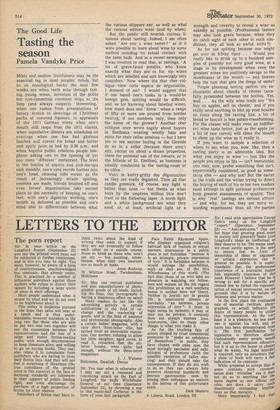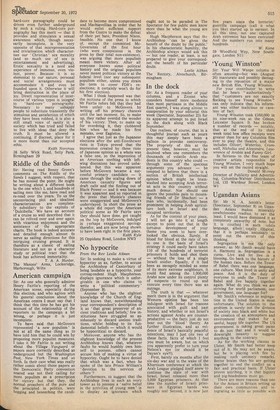The porn report
Sir: In your article on the Longford Report (September 23) you say the printed word must not be subjected to further restrictions, and in this you may be right. You must, however, be aware of a form of restrictiveness, unacknowledged but obstinate, that already exists. This is practised by a number of influential publishers against those authors who refuse to distort their talents by including a large quota of smut in their offerings.
Most people understand what is meant by smut and we do not need to be highfalutin about it.
This policy is doubtless pursued in the hope that sales will soar as a result and is thus understandable, however mistaken in the long run. But those who are able to put two and two together will see the connection between this repressiveness and the loss of a large and stable fiction-reading public with enough discrimination to keep literature alive, and willing to go on buying books. They may also relate it to complaints from publishers who are having to close their fiction lists. And they will not find it surprising if librarians (the true custodians of the printed word in this country) in the face of declining standards are lukewarm in their support of public lending right, and even discourage the purchase of a high proportion of fiction for their shelves.
Publishers of fiction may have to think twice about the kind of writing they want to support if they are not eventually to follow each other on a suicide course. None so blind as those who won't see etc — but puzzling, nevertheless, when their own interests are so much at stake.
Anne Rodway, 75 Whitton Road, Twickenham, Middlesex
Sir: May one remind publishers and also manufacturers of photographic goods of all kinds, including the films, that pornography is having a disastrous effect on sales?
Many readers do not like the advertising activity in certain publications in the field of exchange and the marketing of goods, and in the field of amateur and professional photography. Also a certain ladies' magazine, with a very short three-letter title, has earned itself an unenviable reputation. One mother, refusing to allow her little daughter, aged seven, to read it, remarked that the sixletter bombs, were quite bad enough, without the three-letter magazines.
L. J. Webster Holcombe, Dawlish, Devon Sir: You mar what is otherwise (if I may say so) a reasoned and convincing attack on the Earl of Longford, the buffo Witchfinder General of our time (Spectator September 23), by throwing a sop to this music-hall Cerberus in the form of your last paragraph.
Pace Rabbi Raymond Apple, who displays organised religion's habitual lack of realism in sexual matters, intercourse in a public place is not forbidden "because it is an intimate, private expression of love." It is forbidden because it would outrage the sensibilities, such as they are, of the Mrs Whitehouses of this world. (The fact that those of us who take no pleasure in watching our fellowmen and women on the job regard this prohibition as a rare aesthetic bonus is neither here nor there). Neither in Jewish nor in gentile life is intercourse always or inevitably "an intimate, private expression of love ": it must in legal terms be intimate; it may or may not be private; it certainly does not always express love. Intercourse, like so many other things, is what you make it.
As for the touching fate of actors obliged by cruel commercial pressures to "make an exhibition of themselves" in public, they have chosen with open eyes the most boringly narcissist and exhibitionist of professions (with the possible exception of ballet dancing) and they should take the consequences. If they do not wish to do so they can always help preserve theatrical standards and deoress gastronomic ones by joining their colleagues as waiters in the bistros of this unfortunate town.
Dick Masters 8 Liberia Road, London N5 Sir: I read with approbation George Gale's essay on the Longford " report " (Spectator, September 23) — "Anti-anti-porn." One can but hope that growing good sense in society will generally 'make Lord Longford's ideas as ineffectual as they deserve to be. The major need, we must surely agree, is the need to ensure that no form of censorship of ideas or argument or artistic expression can In general be possible. It is understandable that the professional experience of a journalist makes him especially conscious of this need. However I believe that he is wrong to ask for a specific and limited law to forbid the representation of sexual intercourse, on the grounds that it is by nature an intimate and private matter. In the first place the continuing sale of material (written, photographed, or acted) indicates the desire of many people to utilise this representation. At the very least it is a pleasure; no one need use it against his will, and n° harm has been demonstrated from it. The first justification for legislation is therefore absent. Undoubtedly many people would find such representation offensive, but it is up to the buyer to choose what he wants. No legal interdict is required, only an assurance thf!t a show or book will carry a fair indication of its contents. While prepared to accept that ill some contexts such representation does ' trivialise ' sex it does not do so to anything like the same degree as our official 0,x ethic, nor does it carry s9" disastrously misleading imph°0" tions as that morality.
More importantly I feel that
hard-core pornography could be driven even further underground by such a ruling. Hard-core pornography has this merit — that it provides and stimulates a sexual awareness which, though necessarily incomplete, is the very opposite of that misrepresentation and trivialisation which characterises our ' Christian ' sex morality (and so much use of sex in entertainment and advertising). Erotic sexuality is a need and experience of immense, even violent, power. Because it is so elemental to our nature, personal and social arrangements must accommodate it and even be founded upon it. Otherwise it will bring destruction in the place of joy. Direct representation of intercourse of various types is integral to 'hard-core' pornography. Necessary to many unhappy people to substitute transiently the stimulous and satisfaction of which they have been robbed, it is also a still small voice of sanity in a society which has tried and failed to live with ideas that deny the truth. It must be allowed a continuing, if discreet, place for it is more moral than our accepted ethic.
Keith Norcross 38 Selly Wick Road, Selly Park, Birmingham 29











































 Previous page
Previous page